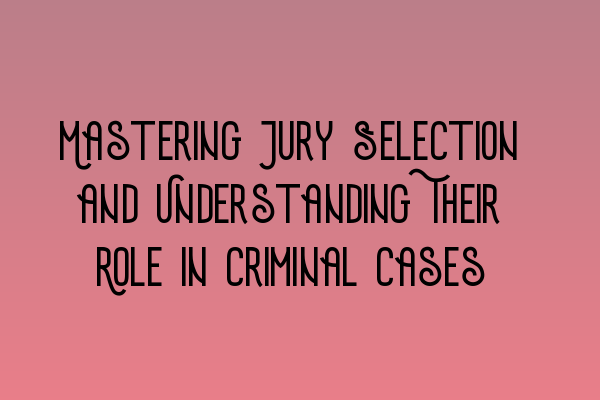Mastering Jury Selection and Understanding Their Role in Criminal Cases
Welcome to SQE Criminal Law & Practice Law UK! In this blog post, we will discuss the importance of mastering the art of jury selection and understanding the crucial role that jurors play in criminal cases.
Why is Jury Selection Important?
Jury selection is a critical stage of any criminal trial. The composition of the jury can greatly impact the outcome of a case, making it essential for solicitors to master the art of jury selection.
During jury selection, solicitors have the opportunity to assess potential jurors based on their backgrounds, beliefs, and biases. This allows them to identify potential jurors who may have preconceived notions or prejudices that could affect their ability to render a fair and unbiased verdict.
By carefully selecting a jury that is open-minded, impartial, and capable of evaluating evidence objectively, solicitors can increase their chances of presenting a compelling case and achieving a favorable outcome for their clients.
The Role of Jurors in Criminal Cases
Jurors are essential participants in the criminal justice system. Their role is to listen attentively to the evidence presented during a trial and ultimately determine the guilt or innocence of the accused.
Jurors must exercise their judgment independently and without bias. They must carefully consider the facts, evaluate witness testimony, and assess the credibility of the evidence presented by both the prosecution and the defense.
It is crucial for jurors to understand that their duty is to base their verdict solely on the evidence presented in court, rather than personal opinions or external influences. Jurors play a vital role in upholding justice and ensuring that the accused receives a fair trial.
Strategies for Effective Jury Selection
Mastering the art of jury selection requires solicitors to employ various strategies to identify potential jurors who are most likely to be fair and impartial. Here are some effective strategies to consider:
- Thoroughly review juror questionnaires: Carefully review the questionnaires completed by potential jurors to identify any potential biases, conflicts of interest, or experiences that may impact their ability to be impartial.
- Conduct effective voir dire examinations: Voir dire examinations allow solicitors to question potential jurors about their backgrounds, beliefs, and experiences. This provides valuable insights into their perspectives and allows solicitors to make informed decisions during the selection process.
- Utilize psychological profiling techniques: Solicitors can employ psychological profiling techniques to gain insights into potential jurors’ personalities and predispositions. By understanding their cognitive biases and decision-making tendencies, solicitors can make more informed decisions during jury selection.
- Consider demographic factors: While it is essential to focus on individual characteristics and beliefs, solicitors should also consider the demographic makeup of the jury pool. Ensuring a diverse jury can help minimize the influence of bias and promote a fair trial.
By employing these strategies and diligently assessing potential jurors, solicitors can greatly enhance their ability to assemble an impartial and attentive jury.
Conclusion
Mastering jury selection and understanding the role of jurors in criminal cases is crucial for solicitors seeking success in the courtroom. By carefully selecting an impartial and attentive jury, solicitors can present a compelling case and increase their chances of achieving a favorable outcome for their clients.
For more resources and information on related topics, please check out our SQE Exam Prep and Demystifying the Solicitors Qualifying Examination Format articles.
